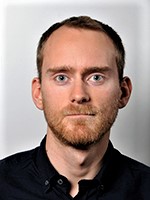Trial lecture
June 3rd, 10:15 AM, Auditorium 3, Chemistry building
‘’The application of artificial intelligence in biochemistry and chemical physics.’’
Conferral summary
I sin avhandling har kandidaten utviklet algoritmer og software for hybrid partikkelfelt-simulering av biologisk myk-materie.
Main research findings
Molecular dynamics describes a simulation strategy wherein systems of atoms and molecules interact, subject to known laws of classical physics. The analysis of the resulting molecular trajectories yields an incredibly powerful computational microscope with atomic resolution, providing a cost-effective alternative to chemical experiments.
Although powerful, these techniques are limited by the number of atoms which can be represented simultaneously. Most biologically interesting systems contain billions of individual atoms making up e.g. cells, organelles, viruses, bacteria, or other microorganisms. In order to model such systems, it is necessary to simplify the description. The simplification treated in this thesis involves decoupling separate molecules, allowing interaction only through a slowly varying density-field. In principle this allows further increases in the system size-reaching biologically relevant soft-matter systems at the mesoscale-while retaining molecular resolution.
My work has helped extend this hybrid particle-field model with the development of open-source simulation software, the addition of pressure control schemes, and a novel approach for determining the necessary model parameters by machine learning. Additionally, some theoretical results on the intrinsic approximations made by the model are considered. The research contained in this dissertation provides important steps forward towards truly realistic model representations of soft-matter systems.
